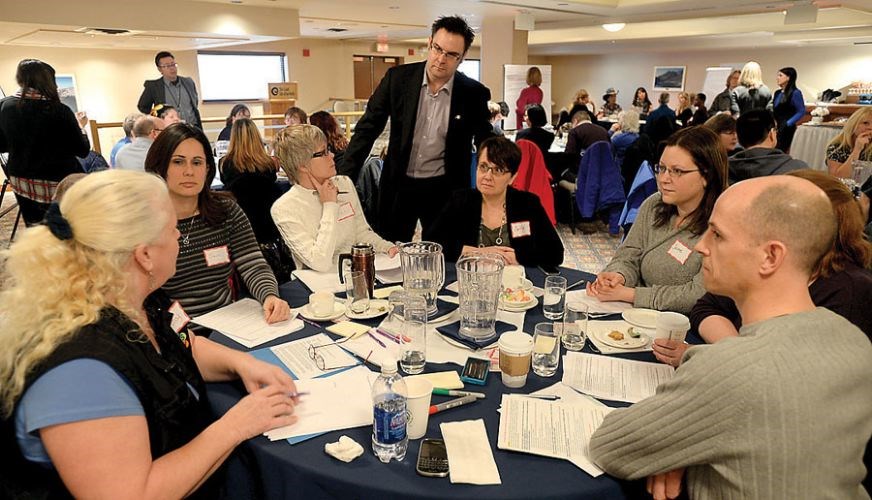This week provided a rare opportunity for area resident with accessibility issues to bring their concerns to those who can actually affect some sort of change.
"Quite often we don't really get a chance to get out beyond the Lower Mainland. We spend a lot of time in Vancouver, a lot of time in Victoria, so it's a huge opportunity for us to hear from you in the communities about exactly what your concerns are," said Molly Harrington, assistant deputy minister with the Ministry of Social Development and Social Innovation. "I think a lot of them are quite different than what they are in Vancouver and Victoria."
The ministry held two sets of community consultations in Prince George Tuesday night and Wednesday morning, soliciting feedback for what's known as a white paper on making improvements to improving accessibility.
As part of their 2013 election platform, the BC Liberals said they "recognize the unique struggle facings persons with disabilities in our province" and that the party believes B.C. "should be the most progressive jurisdiction for the people and families living with disabilities in Canada."
According to the latest Statistics Canada information, nearly 15 per cent of British Columbians ages 15 and older identify as persons with disabilities.
As it stands right now, there are things the province is already good at, said Minister Don McRae, who was in Prince George for the sessions.
"Some of the support programs we have here, like [Equipment and Assistive Technology Initiative], it's recognized as being a nationally leading program. Some of the social innovation work we're doing is absolutely phenomenal," he said. "But the question is can we always be doing a little bit more?"
On Dec. 3, the ministry launched an online discussion portal (www.engage.gov.bc.ca/disabilitywhitepaper), which they say has already had 12,000 hits and 400 submissions. The website will be taking in feedback until March 14 and a white paper will be produced and publicly available prior to a June summit.
"It's not always an easy conversation and I'm prepared for that," said McRae.
And participants in the two sold-out forums had plenty to say.
One group, led in conversation by Employment Action executive director Lori Forgeron, said a dedicated advocate for persons with disabilities could make a difference, especially since major groups such as the B.C. Coalition of People with Disabilities is based in the Lower Mainland.
"There's a whole pile of associations down south," said one participant, named Sue, who is the mother of a person with a disability. "We're really high and dry here."
There's also no element of a personal touch or connection.
The Ministry of Social Development and Social Innovation used to have separate offices in Prince George for those with disabilities and those receiving other kinds of assistance. But when they were lumped together, participants said they lost the element of sensitivity.
"We would have a specific worker assigned to each individual," said Steve Willment. "That way they have the opportunity to develop a rapport with you, know who you were, what you've been through, know what your issues are."
Now, a visit that could be for getting a form could take up to an hour or more, said another participant, named Gord, explaining how that's a challenge for people with mobility issues and how frustrating it is to have to tell people your history and story every time.
How private are an individual's files, really, when any any worker can call them up, asked Gord's wife, Karen.
There are six areas of focus through the consultation: innovation in disability services and more accessibility for persons living with disabilities; personal supports, aids and devices; work and contribution; housing and accessibility in the broader built environment; social networks to support people in the community; and asset accumulation through the Registered Disability Savings Plan, in particular.
A notable omission is financial support.
A single person living with disability is eligible for up to $906 per month in disability assistance. If they are able to work, they can earn up to $800 per month or $9,600 per year without reducing that assistance amount.
Michael Prince, a professor of social policy at the University of Victoria and author of 2009's Absent Citizens: Disability Politics and Policy in Canada, said he was disappointed by the ministry's refusal to address the elephant in the room.
"I think a lot of people with disabilities find it disheartening to be told they have to wait yet again," he said. "They've been told that for a long time."
According to McRae, by having these conversations the ministry, and ultimately the government, is building a road map for the future, looking for short- to long-term gains.
"Right now, we are balancing a budget - there isn't a ton of money out there. The premier and myself are on record, we'd like to see rates go up for persons with disabilities," said McRae. "But it's very expensive and we don't have those dollars today. But in the future when dollars are there, that's an add I'd definitely like to look at."
If the public accepts the argument about the budget, there should at least be some signal that there will be a plan, said Prince.
"Give the community and families hope and something positive rather than the just the negative 'sorry the cupboard's bare, go away,'" he said.
There is also the worry of raising people's expectations too high when embarking on an exercise such as this, said Prince, particularly when dealing with a vulnerable or marginalized population.
But the general mood for some participants wasn't overly optimistic about future outcomes.
"It's exhausting," Forgeron said, referring back to comments Gord made prior to the evening's official start. "People say 'we're here again, we've been here before, we've said this before. It's mentally exhausting to keep putting yourself out there.'"
Willment echoed those frustrations.
"This meeting thing, on the surface, it's wonderful. But do I expect anything to come from it that is meaningful? Absolutely not."



